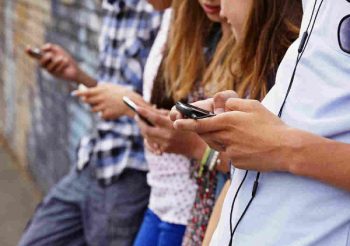(Nikki Harper) If you’ve got teenagers, you probably know how hard it can be to separate them from their smartphones. Statistically, 95% of 17-20 year olds use smartphones [1] and parents might be forgiven for thinking that a good number of those actually have their phones attached to them via some kind of technological umbilicus. Research into the connections between smartphone use and mental health is still in its infancy, but many suspect that an increasing reliance upon smartphones can be detrimental to our psychological wellbeing.
Related Illegal Levels of Radiation Emitted by Popular Cellphones
by Nikki Harper, October 30th 2019
Of course, teens can often be moody and depressive; it’s part of their job. We’ve all been there. Most of us, however, navigated our teen years without the benefit, or otherwise, of smartphone technology. You might think that teens who are lonely and depressed end up reliant on their smartphones – but could it actually be the other way round? Could smartphone use be a predictor for future loneliness and depression?
New research from the University of Arizona suggest that yes, reliance on a smartphone can lead to loneliness and depression, not the other way round [1]. Researchers Matthew Lapierre, Pengfei Zhao and Benjamin Custer studied 346 adolescents between the ages of 17 and 20, in a longitudinal study over three months. They chose this age group to study precisely because teens of this age are already vulnerable to depressive factors, due to their hormonal changes and the stage of life transition they are in.
Buy Book Trance: Formation of America
During the research, the teens were asked to score themselves on a four-point scale for questions related to smartphone dependency – for example, the statement “I panic when I cannot use my smartphone” [2]. They also answered other questions designed to reveal the amount of their smartphone use, how lonely they felt and where they scored for several depressive factors. Participants answered the questions once at the start of the study and again at the end.
The results were quite startling. The research team found three key indicators [1]:
- Smartphone dependency at the beginning of the trial predicted loneliness and depression at the end
- Loneliness at the beginning of the trial predicted depression at the end
- Smartphone use at the beginning of the trial predicted smartphone dependency at the end
Note that the trial distinguishes between smartphone use – casual, non-dependent use, which can be beneficial – and smartphone dependency, where the user has a psychological reliance on the device.
Buy Orgonite Cell Phone Protector (Helps Negate Harmful Radiation)
These findings are significant because they suggest that a new approach is needed to help advise teens and their families about the potential psychological risks in becoming dependent on smartphones. The research team suggest that in addition to a new strategy from healthcare providers, teens should be advised on how to find other ways to manage stress – since many turn to smartphones as a way to alleviate stress [2]. Suggestions might include exercise, meditation and socialising more. Further, the researchers would like to see teens learning how to self-impose limits on smartphone use.
Our current generation of older adolescents and young adults have grown up with smartphones – and they see the adults around them just as potentially depended upon them too. However, with rate of depression and anxiety among young adults known to be skyrocketing, perhaps it really is time for a more balanced approach towards the ubiquitous smartphone.
Article sources:
- [1] https://www.jahonline.org/article/S1054-139X(19)30337-4/fulltext
- [2] https://www.sciencedaily.com/releases/2019/09/190930161918.htm
Buy Book Morphic Resonance: The Nature of Formative Causation
About the author
Nikki Harper is a spiritualist writer, astrologer, and editor for Wake Up World.
Stillness in the Storm Editor: Why did we post this?
The Deep State has weaponized many aspects of modern life, for the purpose of creating dependency on the medical industry as well as destroying well being in general. This agenda hinders an individual in their quest for autonomy, wellbeing, and social harmony. The preceding information reveals the destructive force of Wifi, Cell Phones, and modern electronics in general. With this knowledge in hand, an individual can dispel the false reality that these devices are safe. In doing so, they’ll also step closer to the greater realization that the powers that be have breached the public trust, which will slowly lead to activation of the truth-seeking and freedom craving urge that will one day led to the liberation of the individual and planet at large.
– Justin
Not sure how to make sense of this? Want to learn how to discern like a pro? Read this essential guide to discernment, analysis of claims, and understanding the truth in a world of deception: 4 Key Steps of Discernment – Advanced Truth-Seeking Tools.
Stillness in the Storm Editor’s note: Did you find a spelling error or grammar mistake? Send an email to [email protected], with the error and suggested correction, along with the headline and url. Do you think this article needs an update? Or do you just have some feedback? Send us an email at [email protected]. Thank you for reading.
Source:

Leave a Reply